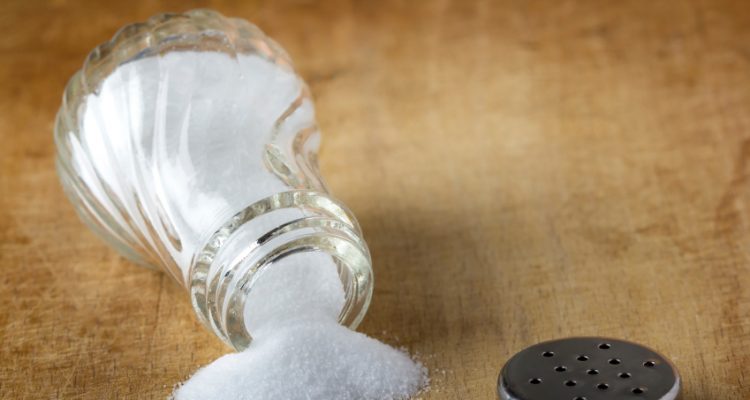
If you like salty foods or if you find yourself adding extra salt when you cook, you may want to think twice…
Not only can too much sodium increase your blood pressure, but there is also the risk of heart disease and stroke.
Your body does need some salt and sodium, but the candid truth is you are likely taking in far too much. You can also build a tolerance to salt, so you need to use more and more of the stuff to get your “fix.” This is frightening because you may not even be aware over time that your salt intake has increased, which means the risks to your health increase alongside it.
The recommended intake of sodium depends on the person and individual needs, age, risk factors for illness and disease, and gender. Despite this, a very general guideline has been set showing that 1,800 mg of sodium per day is getting into unhealthy territory.
You Don’t Need to Add More Sodium
It’s important to remember that the vast majority of sodium you consume per day is found in your regular diet already, so adding more is simply not needed. Of course, some food has more than others. For example, watch the fast food: A hamburger alone from a fast-food chain can contain your daily limit of sodium.
Sodium is a much bigger issue for people who have a chronic disease. One example is type 2 diabetes, which has been in the news recently due to its link to sodium intake and double the risk of cardiovascular disease—double!
Published in the Endocrine Society’s Journal of Clinical Endocrinology & Metabolism, this new study conducted in Japan looked at 1,588 adults aged 40 to 70 who were diagnosed with diabetes. The participants were assessed with questionnaires regarding eating habits, including sodium intake, and the rate of cardiovascular complications over an eight-year follow-up period.
The participants were divided into four groups based on the amounts of daily sodium they consumed and matched with the estimated risk of experiencing cardiovascular complications.
Diabetics, Hold the Salt, Please
The study revealed that those people who consumed 5.9 g of sodium daily developed twice the risk of experiencing cardiovascular complications compared to those participants who consumed 2.8 g of sodium daily. Those who consumed the most sodium also had a greater degree of poor blood sugar control than those who ate the least amount of sodium.
“To reduce the risk of developing cardiovascular disease, it is important for people who have type 2 diabetes to improve their blood sugar control as well as watch their diet,” study author Chika Horikawa of the University of Niigata Prefecture in Niigata, Japan told ScienceDaily. “Our findings demonstrate that restricting salt in the diet could help prevent dangerous complications from diabetes.”
However, my thoughts regarding this study are that 2.8 g per day of sodium is still far too high and greatly exceeds recommended values for sodium intake.
If the lower sodium consumption participants had the recommended daily limit for sodium, 1.5 to 1.8 g, they may have enjoyed a much greater benefit compared to those who consumed the highest amounts of sodium. The results would have been much more meaningful.
Lifestyle Causes Most Common Chronic Disease
But the implications stand, nonetheless—and they are widespread. According to the Centers for Disease Control and Prevention (CDC), there are approximately 29 million Americans living with some form of diabetes. This disease rapidly is becoming the most common chronic disease for Americans. The reason comes down to lifestyle dynamics and the high rates of obesity, lack of regular physical activity and a diet inundated with fast food, sugar and empty calories.
To add to the trouble at hand, this population is at risk for heart disease. According to the CDC’s 2014 National Diabetes Statistics Report, between 2003 and 2006, cardiovascular disease death rates were about 1.7 times higher among adults diagnosed with diabetes than those who were not.
Avoid the drive-thru window and banish the salt shaker from your table.
Sources:
“High-salt diet doubles threat of cardiovascular disease in people with diabetes,” ScienceDaily website, July 28, 2014; http://www.sciencedaily.com/releases/2014/07/140722142511.htm.
Horiakwa, C., et al., “Dietary Sodium Intake and Incidence of Diabetes Complications in Japanese Patients with Type 2 Diabetes – Analysis of the Japan Diabetes Complications Study,” The Journal of Clinical Endocrinology & Metabolism 2014; doi: 10.1210/jc.2013-4315.













